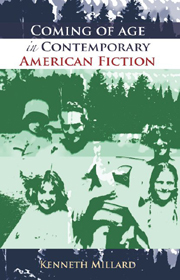Book contents
- Frontmatter
- Contents
- Acknowledgements
- Introduction: Contemporary Coming of Age – Subject to Change
- 1 In the Name of the Father
- 2 I Change Therefore I Am: Growing up in the Sixties
- 3 Citation and Resuscitation
- 4 Language Acquisition: Life Sentences
- 5 Lexicon of Love
- 6 Memoirs and Memorials
- Conclusion
- Bibliography
- Index
Conclusion
Published online by Cambridge University Press: 12 September 2012
- Frontmatter
- Contents
- Acknowledgements
- Introduction: Contemporary Coming of Age – Subject to Change
- 1 In the Name of the Father
- 2 I Change Therefore I Am: Growing up in the Sixties
- 3 Citation and Resuscitation
- 4 Language Acquisition: Life Sentences
- 5 Lexicon of Love
- 6 Memoirs and Memorials
- Conclusion
- Bibliography
- Index
Summary
The popularity of the coming-of-age genre in the United States is partly a symptom of Americans' abiding fascination with the idea of innocence. This innocence is conceptually biblical in origin and is therefore further evidence of the nation's fundamentally religious character. At the same time, the narrative of coming of age permits writers to interrogate the historical circumstances that have separated their protagonists from an original innocence which is mythical, imaginary, or nostalgic. The novelist's representation of that history thereby facilitates a close critical scrutiny of the specific cultural pressures of American socialisation, or, as Cleo Birdwell expressed it in her memoir, Amazons, ‘Only childhood is ours. The rest belongs to strangers’ (Birdwell 1980: 1). The coming-ofage genre taps into a rich legacy of American representations of innocence, and it also engages with the politics of historiography in ways that can always be given a contemporary inflection; the genre is thus anchored by a sense that there are antecedent voices that give it a historical provenance that is uniquely American.
For example, both Philip Roth's American Pastoral (1997) and John Updike's Memories of the Ford Administration (1992) give broad currency to these ideas, beyond the parameters of the genre of coming of age. Roth's novel has an absolutely forensic interest in ideas about innocence and origins, and it is structured in terms of sections entitled ‘Paradise Remembered’ and ‘The Fall’.
- Type
- Chapter
- Information
- Coming of Age in Contemporary American Fiction , pp. 181 - 182Publisher: Edinburgh University PressPrint publication year: 2007



